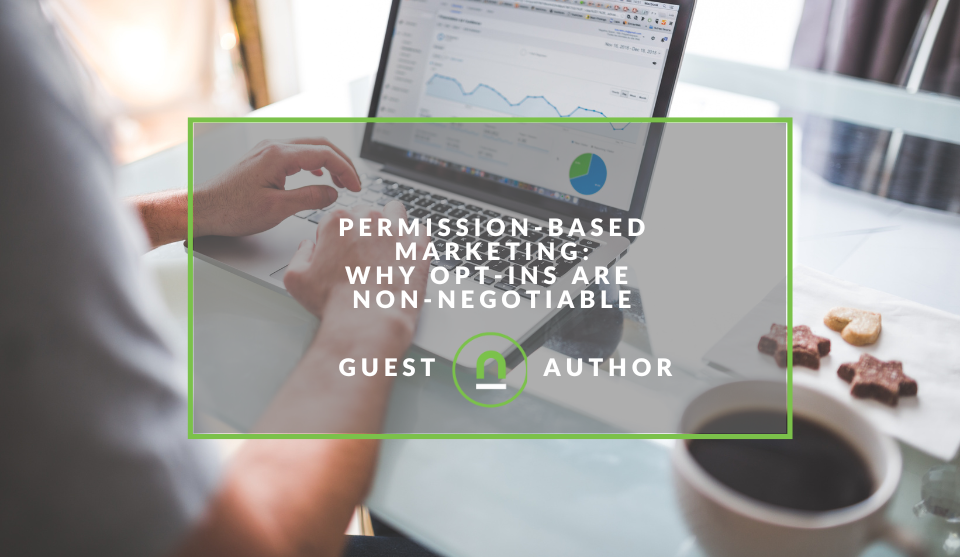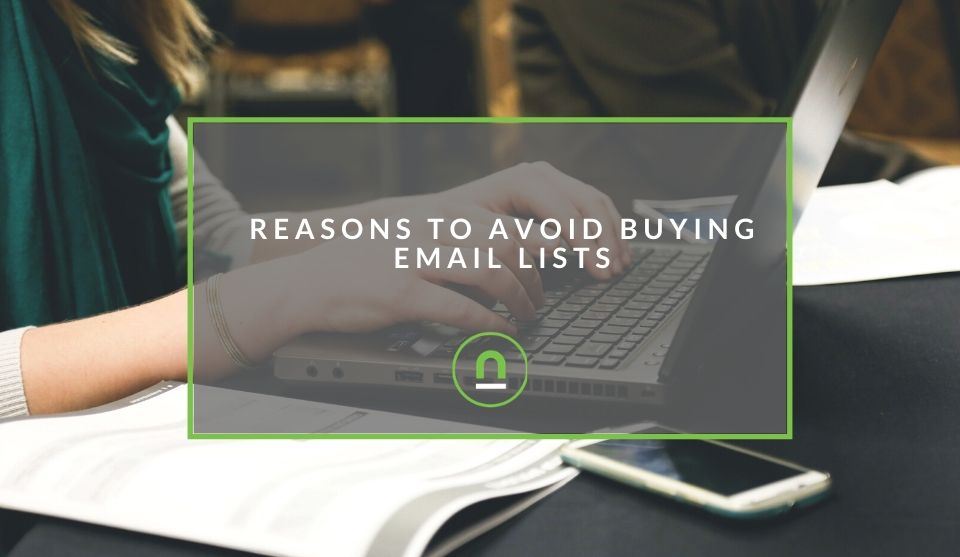Recent posts

Money Talks
An Introduction to Forex Trading Contests
14 February 2025

Constructive Criticism
Exploring Eco-Friendly Materials for Laser Cutting Projects
11 February 2025

Industry Experts
Permission-Based Marketing: Why Opt-Ins Are Non-Negotiable
07 February 2025

Constructive Criticism
4 Benefits of Using Epoxy Glue for Your DIY Projects
05 February 2025
Popular posts
Extravaganza
Trending Music Hashtags To Get Your Posts Noticed
24 August 2018
Geek Chic
How To Fix iPhone/iPad Only Charging In Certain Positions
05 July 2020
Extravaganza
Trending Wedding Hashtags To Get Your Posts Noticed
18 September 2018
Money Talks
How To Find Coupons & Vouchers Online In South Africa
28 March 2019
10 Reasons To Avoid Buying Email Lists
16 April 2020 | 0 comments | Posted by Che Kohler in nichemarket Advice
Reaching out to new and existing customers is a fundamental part of every businesses operation. In digital marketing, we now have a range of channels that allow you to reach audiences, but none of these channels is more important than the channels you have full control over, such as direct channels.
Every business should know the importance of building lines of communication with their customer base; this could be through app notifications, browser notifications, SMS, Instant Messaging Groups and of course, email.
Building a healthy email database with active users and segmenting them into interest sets that make sense for your business is a long and arduous process, especially when you're starting a new business. Finding a shortcut to success always sounds attractive and you can naturally spend money on lead generation forms to gather email address, but this can be costly, which is why many business owners are tempted to buying email lists.
What are sold or rented email lists?
An email list typically includes the names and email addresses of a list of prospective clients. Depending on the service provider, you could also access other geographics, demographics as well as LSM levels. It makes perfect sense to want to buy a list of contact details that have the exact clientele you're looking for and want to speak to turn into customers.
The sad truth is its more often than not a lousy idea and many times turns out to be a big waste of money. The reseller also does not have to guarantee the performance of the database and is only selling you a list of contact details.
If you're considering buying an email list to kickstart your direct marketing efforts, then here are ten reasons why you should avoid this approach at all costs.
1. List quality
Unfortunately, those selling email lists aren't too concerned about the quality of the contact list or if they are the ideal fit for your business. They're there to sell these contacts to as many companies as possible. If you're allowed to review the list before purchasing you should check the following:
- Missing or incomplete data (e.g. having the wrong names for individuals on the list)
- Out-of-date information (loads of the email addresses that no longer exist, or are contract details that have been abandoned or lost and in some cases recycled).
- Email addresses illegally harvested from the web (people who haven't chosen to be on any list, which is against the CAN-SPAM Act)
Email list providers sell you on volume and not on quality, and nominal figures might sound great like getting 10 000 signups for a few cents each but the damage it can cause you could be far costlier in the long run.
2. Being seen as a spammer
Does anyone in the world welcome or enjoy receiving unsolicited emails? I would imagine those people are in a small minority, especially if the message they're receiving is trying to sell them something. Spamming is hardly well-received the majority will ignore or delete it. Still, some may be so enraged by this violation of privacy they will contact you directly or take to social media to voice their concerns.
Is this a brand and PR risk you're willing to take for the sake of a few sales? You may mean well and believe that your emails contain high-quality information, but from the recipient's perspective, you're just another unknown spammer.
3. Causing issues with your email service provider
Sending mass emails usually requires a third-party email provider like MailChimp, SendGrid etc. who are all keen to keep their email routes clean and not support spamming. If too many of your emails are marked at spam at an alarmingly high rate, providers will flag this as abuse, and they could throttle your account or worse. You could be fined or even have legal action taken against you for violating the mail clients terms of service.4. The list is overused
There is no competitive advantage derived form purchasing an email list because when you buy an email list, all you're doing is spamming a contact list other businesses have spammed before you. It's in the seller's economic incentive to give this list to as many companies as possible and thus reducing the effectiveness of the list each time it has been sold.
The cheaper the cost per contact or the more the seller is willing to negotiate the more you can be sure that the list has been sold more times than there are contacts and is going to have an abysmal response rate.
5. Poor response rate
As mentioned in my previous point, these poor lists have been flogged to a point where responses are pretty low. When you're buying a contact email list, you're banking on a specific % conversion rate to provide you with a return on investment. You will need to work out if the number of users you can reach and convert will be worth the amount you're paying.
Average open rates are around 20 – 25% for healthy, targeted lists. Lists that you purchase are likely to have far lower open rates and will require far more numbers to give you an acceptable click-through rate and conversion rate to provide a viable return on your investment.
6. A knock on reputation
I mentioned before that your email service provider might cut you off and you could think well, I'll move to a new email tool instead, which yes can seemingly get you around the problem, but not entirely. Contacts on that list may take action and put up reviews on your Facebook, Google My Business, Twitter or even their blog which can all be tied back to you and leave a mark on your reputation.
Reputation is crucial online, and you don't want to be spending vast amounts of time and money on reputation management, trying to get search results buried. Cleaning up your online image could end up costing you far more than avoiding buying an email list could have in hindsight.
7. A fine or legal bills
As regulators try to crack down on spamming consumers, we've seen measures like GDPR in Europe and POPI in South Africa start to provide consumers with more protection. Most countries have laws against sending out unsolicited bulk email, such as the CAN-SPAM Act in the United States.
While you may still be on the right side of the law–even using a bought email list in your part of the world, you aren't out of the woods yet. If lots of subscribers complain (and they probably will), you may face a costly battle to prove that you didn't do anything technically wrong.
Also, keep in mind that different countries have different laws. If the email list you bought includes people from another country, you will have to abide by those laws.
8. The recipient has no idea who you are
Email marking is a direct form of communication, and this means consumers would generally provide you with permission to reach out to them, they would know who you are before you email them. When buying an email list, you are forcing your way into unsuspecting inboxes, alienate prospective clients, and ruin your chances of building a relationship with them for future business.
Remember, 70% of customers open emails from their favourite companies, so doesn't it make more sense to focus on acquiring contacts that know who you are and what you offer?
9. Rebuilding your sender score will take time
Remember I mentioned earlier you could change email providers, but it might not help entirely? Well because your domain has a sender score attached to it and it followers your web domain wherever you go, regardless of the provider you are using to send you emails. If your web domain is flagged as being a spammer, it can take months, even years for you to rebuild your score and during that time even contacts you've acquired legitimately through your various sign-ups might not receive your emails due to junk mail filters blocking you.10. No reputable expert recommends it
Don't take my word for it; I encourage you to get second, third, fourth and even twenty opinions. Speak to marketers and reach out to customers who have purchased these lists before, don't only take the word of the list seller. Read any of the popular email marketing blogs, and you'll hear them all agree with one thing, and that is never to buy email lists. Buying email lists is a waste of money and time, and may seriously harm your company. So unless you're looking to make things harder for yourself in the future, this is not a route you should be taking.
Protip!
If you're looking to build an email database organically, then I suggest checking out the following posts:
Let us help you
Should you require help setting up or improving your sites email marketing, we're happy to help, feel free to contact us. for a consultation.
Are you looking to promote your business?
South African retail business owners can create your free business listing on nichemarket. The more information you provide about your business, the easier it will be for your customers to find you online. Registering with nichemarket is easy; all you will need to do is head over to our sign up form and follow the instructions.
If you require a more detailed guide on how to create your profile or your listing, then we highly recommend you check out the following articles.
Recommended reading
If you enjoyed this post and have a little extra time to dive deeper down the rabbit hole, why not check out the following posts about eCommerce.
- Set Up An Abandon Basket Drip Marketing Campaign
- 5 Benefits Of Using CRM For Your Business
- 10 Emails Every eCommerce Site Should Have
- SEO Spam Emails - Can We Put A Stop To This?
- 5 Free Email Suite Options
- Email Personalization Mistakes to Avoid (And How to Fix Them)
- Email Marketing Tactics To Rejuvenate Channel Performance
Tags: Email Marketing
You might also like
Grow Your Profile With Cheap Instagram Followers
14 January 2025
Posted by Ashley Ingram in Industry Experts
How can you start to inflate the numbers on your Instagram account by purchasing followers? What are the pros and cons of this strategy and what to l...
Read moreExploring Eco-Friendly Materials for Laser Cutting Projects
11 February 2025
Posted by Candice Reed in Constructive Criticism
Are you looking for environmentally friendly materials for laser cutting projects? We take a look at the various materials that would fit your requir...
Read more{{comment.sUserName}}
{{comment.iDayLastEdit}} day ago
{{comment.iDayLastEdit}} days ago
 {{blogcategory.sCategoryName}}
{{blogcategory.sCategoryName}}

